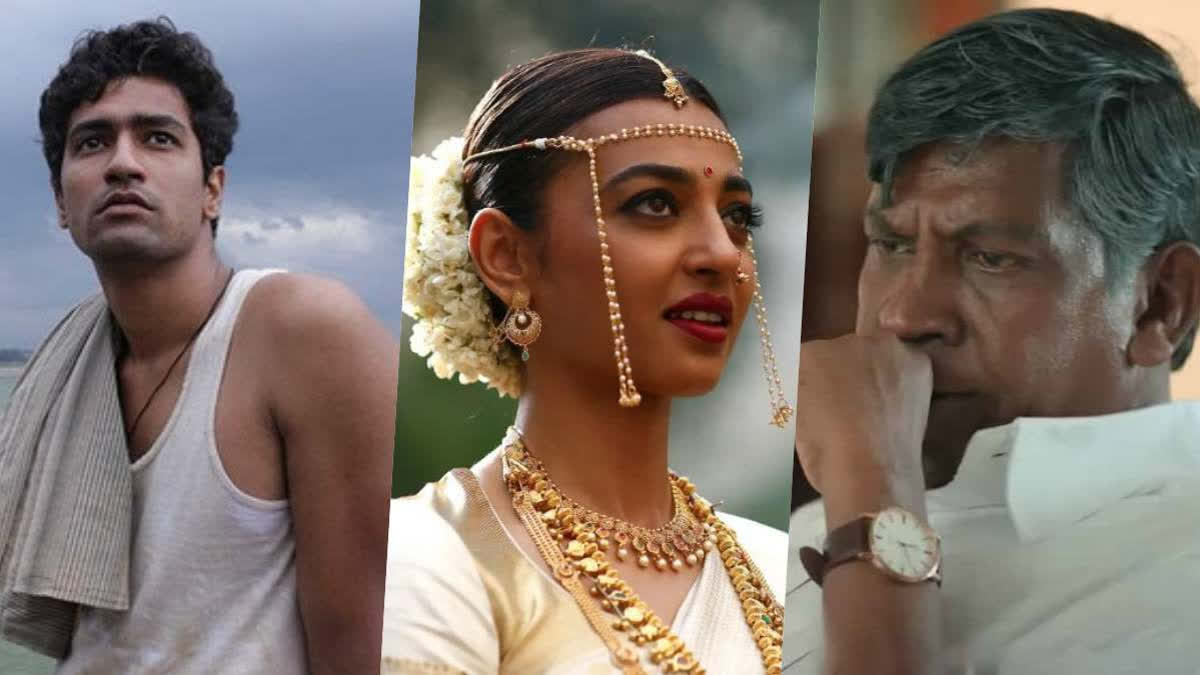On Mahaparinirvan Din, the death anniversary of Dr. BR Ambedkar, we are reminded of his long and tireless struggle for social justice, equality, and the rights of the oppressed. His beliefs about the power of education to uplift the marginalised and the importance of asserting one's identity echo through many of the films and web series that have emerged in recent years. Sometimes overt and at other times subtle, these themes reflect ideology of social change and the long battle against caste-based discrimination fought by Ambedkar till his last.
In Masaan (2015), we follow the emotional journey of Deepak Kumar (Vicky Kaushal), a young engineering student from an underprivileged community who struggles to assert his identity, especially after falling in love with a girl from an upper caste. His story is not just about love, but about breaking free from the rigid caste barriers that have shaped his life. In contrast, the character Pallavi Manke (Radhika Apte) in Made in Heaven Season 2 (2023) confidently asserts her Dalit identity as a professor, even when faced with personal and societal challenges. Radhika as Pallavi embodies Ambedkar's belief that education and self-respect are the keys to equality.
On the other hand, Maamannan (2023), a Tamil film by Mari Selvaraj, introduces Rathnavelu (Fahadh Faasil), a politician coming from a dominant community who proudly asserts his caste pride, reminds us that caste dynamics still influence social interactions and the fight for equality. These diverse portrayals, whether direct or subtly woven into the narrative, continue the conversation about social justice and identity, reflecting the relevance of Ambedkar's vision in modern times.
The past few years have marked a significant shift in Indian cinema, with Dalit characters being portrayed not as helpless victims but as individuals who are capable of transforming their worlds. While earlier representations in parallel cinema often reduced Dalit characters to passive figures suffering under systemic oppression, recent films have given rise to new narratives that show Dalits as resilient, dignified protagonists, just as Ambedkar would love to see them.
Films like Sairat (2016), Jai Bhim (2021), Bheed (2022), and Shamshera (2022), among others, highlight the vulnerability, dignity, strength, and resistance of Dalit characters. These films challenge the stereotypical portrayals of the past and offer a more nuanced view of the oppressed.
Directors such as Neeraj Ghaywan, Nagaraj Manjule, Mari Selvaraj, and Pa Ranjith, many of whom belong to Dalit backgrounds themselves, have been instrumental in changing the narrative. Through their work, they not only showcase the complexities of caste dynamics but also bring forward the idea of asserting one's identity.
Ghaywan's Masaan is a perfect example, where Deepak, although struggling to openly accept his identity, gradually finds the strength to start again after losing the love of his life. He immerse himself in work after joining the Railways as an engineer. Characters in films like Jai Bhim and Maamannan are also glowing examples of Ambedkar's idea that education, self-respect, and asserting one's identity are the keys to breaking free from the chains of oppression.
The portrayal of Dalit characters as fighters for social justice are more a deliberate ideological statement than an aesthetic choice. Films like Majhi, the Mountain Man (2015) and Sarpatta Parambarai (2021) show Dalit characters as not only struggling against caste discrimination but also actively creating a space for themselves in the larger social and political landscape. These films, through their alternative narratives and realistic portrayals, disturb the conventional, often simplistic narratives seen in mainstream cinema, which tend to gloss over caste issues or present them in a distorted manner.
The presence of Dalit characters in cinema are also breaking away from stereotypical portrayals. Made in Heaven 2 stands out for presenting Pallavi Manke as a proud Dalit woman with a voice and agency, someone who challenges the social norms and asserts her identity in a world that often marginalises such voices. The character's insistence on including a Buddhist ritual in her wedding is a direct nod to Ambedkar's emphasis on the importance of asserting one's cultural identity and heritage.
Following the release of Made in Heaven 2, Prakash Ambedkar, the grandson of Dr. B.R. Ambedkar, praised the portrayal of Pallavi Manke, particularly appreciating how the character, despite her education and success, continues to face the social burdens of caste discrimination. His praise highlights the relevance of Ambedkar’s teachings in today’s world, where caste-based prejudice continues to persist despite significant social and legal progress. In a tweet, Prakash Ambedkar specifically pointed out how Pallavi’s character serves as an inspiration to those battling caste-based prejudice, urging them to assert their identity in order to gain political prominence and social recognition.
In Bheed, the character of Surya Kumar Singh Tikas (Rajkummar Rao) faces the scars of casteism throughout his life. The decision to remove the caste-based surname from his identification documents in an attempt to avoid discrimination reflects the painful reality of living under the shadow of caste, but his eventual journey towards reclaiming his identity underscores the theme of self-empowerment and the assertion of one's rightful place in society, a concept the Bhim staunchly advocated.
Films like Jai Bhim, Asuran, and Maamannan explore themes of justice, equality, and the protection of Dalit rights, with a strong undercurrent of Ambedkar’s influence. Jai Bhim specifically highlights the oppressive structures that Dalits face, showing how justice, when sought through legal means, becomes a tool for social change, much like Ambedkar envisioned when he drafted the Indian Constitution. Similarly, Maamannan explores the radical idea of Dalit empowerment and resistance against the forces that uphold caste-based discrimination, challenging the status quo much like Ambedkar did throughout his life.
Read More
- Mahaparinirvan Diwas Observed To Commemorate Death Anniversary Of Dr Babasaheb Ambedkar
- Books On Ambedkar, Dom Community In Kamaladevi Chattopadhyay NIF Book Prize Shortlist
- Day of Equality: Remembering 'Architect of Indian Constitution' Dr B R Ambedkar
